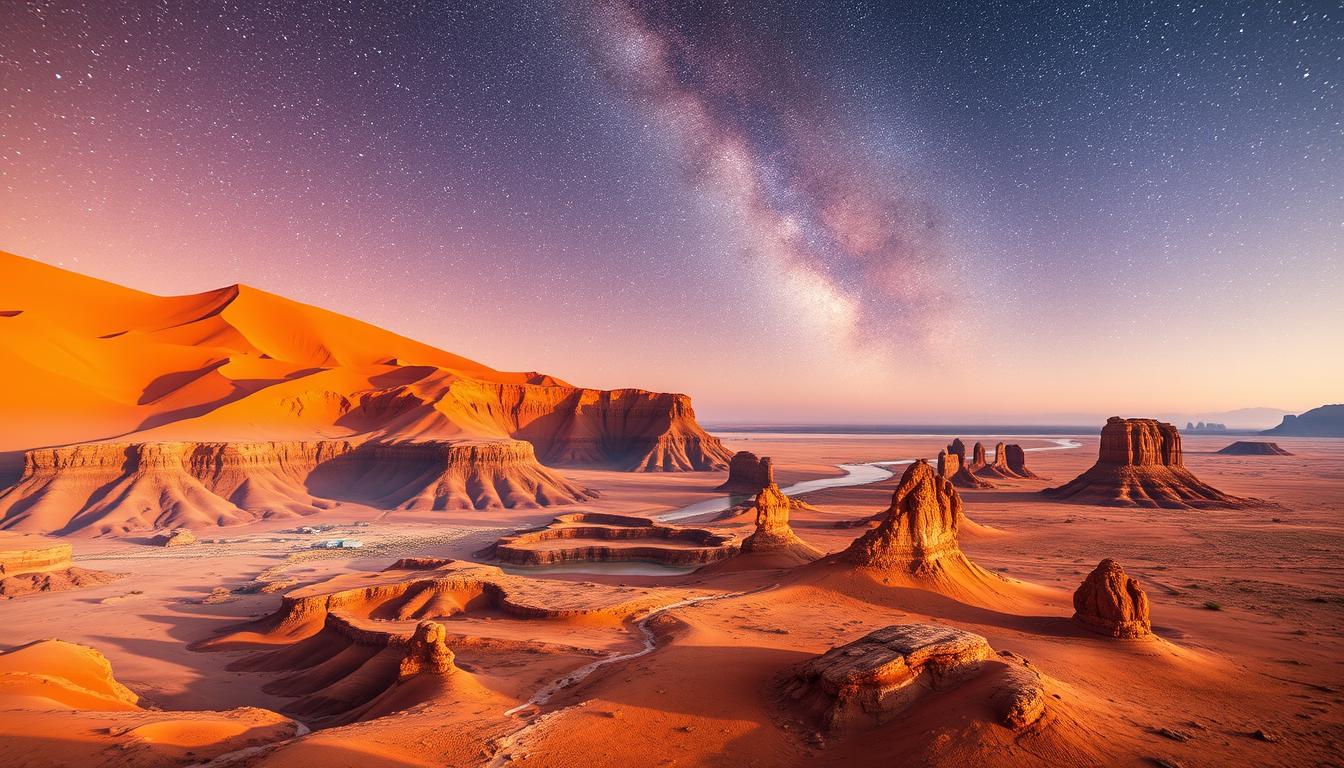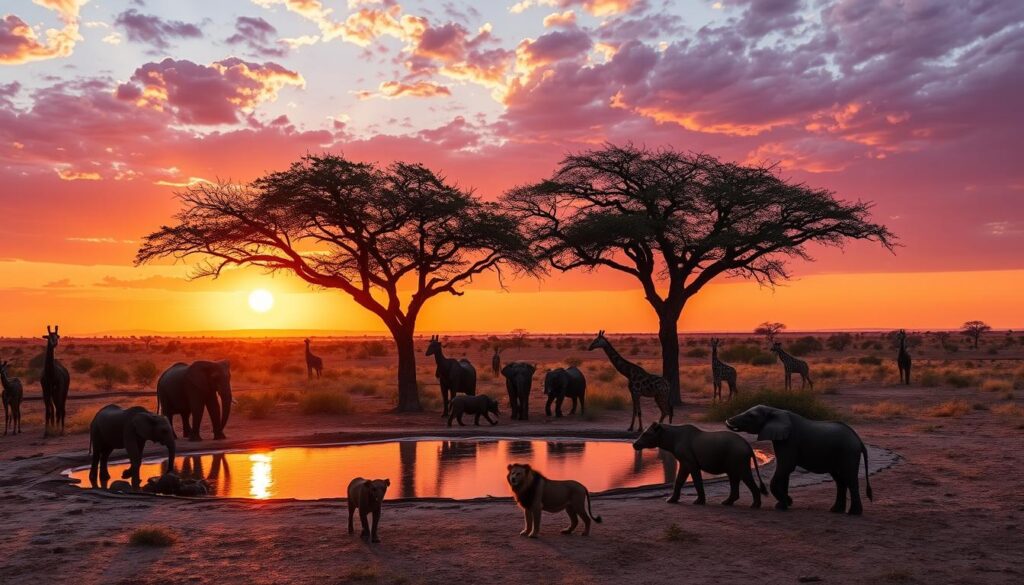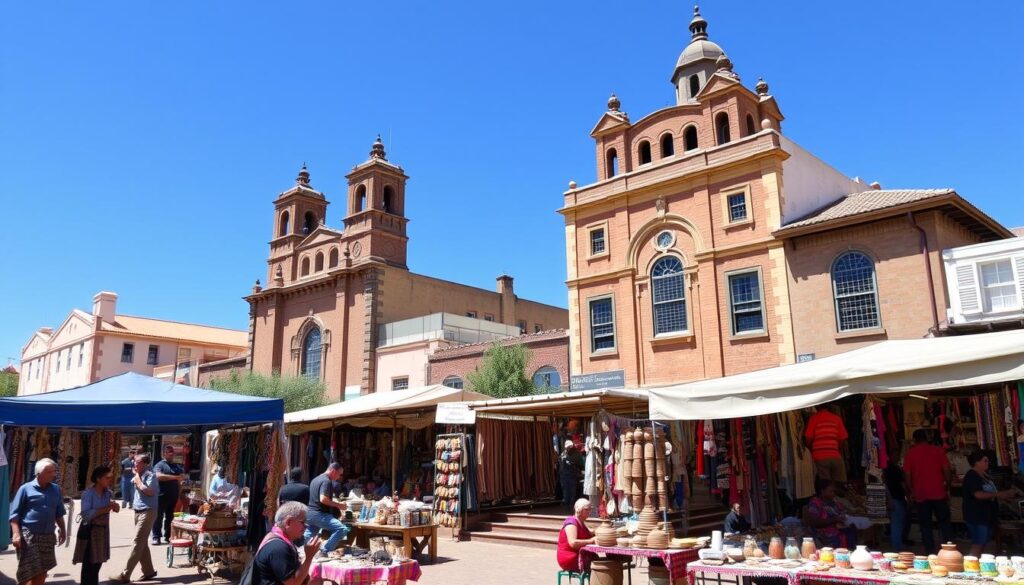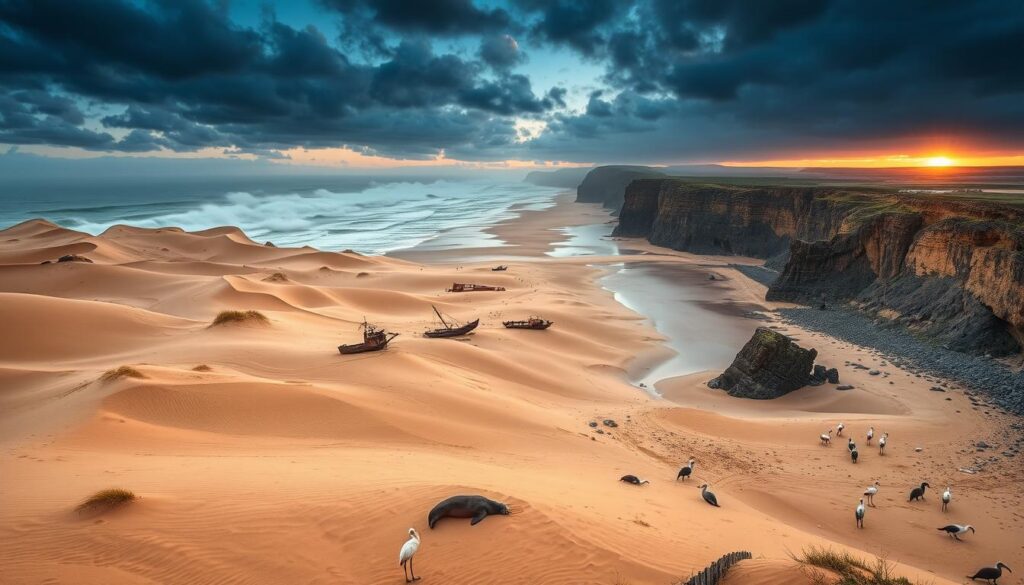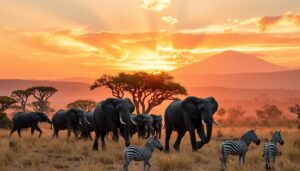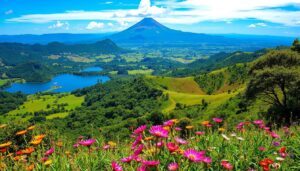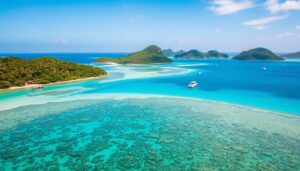Standing atop a towering dune, I felt wonder and adventure. Namibia, with its vast landscapes and rich wildlife, had won my heart. From Sossusvlei’s sand dunes to Etosha’s wildlife, this place is unforgettable.
Namibia has attractions for every traveler. Whether you want a quiet getaway, an adventure, or a family trip, it’s perfect. Its roads are easy to drive, making it great for exploring on your own.
My journey through Namibia left me with unforgettable memories. I saw Sossusvlei’s dunes, Etosha’s wildlife, the Skeleton Coast’s ruggedness, and Windhoek’s history. Namibia is a true African gem, blending nature, culture, and adventure.
Key Takeaways
- Namibia is a sparsely populated country with diverse and stunning landscapes, from the Namib Desert to the Skeleton Coast.
- The country offers a range of attractions, including the mesmerizing sand dunes of Sossusvlei, the wildlife-rich Etosha National Park, and the historic charm of Windhoek.
- Namibia’s well-developed infrastructure and easy-to-navigate roads make it an ideal destination for self-drive holidays, allowing travelers to explore at their own pace.
- The country caters to a variety of travelers, from those seeking a romantic getaway to families and adventure-seekers.
- Namibia’s combination of natural wonders, cultural richness, and adventurous opportunities make it a truly unique and unforgettable destination in Africa.
Exploring the Stunning Namib Desert
The Namib Desert is along Namibia’s western coast. It’s the oldest desert on Earth. Sossusvlei, in the Namib-Naukluft National Park, is a key spot. It shows off the desert’s beauty.
Unique Landscapes of Sossusvlei
Sossusvlei is famous for its tall dunes. They are painted in shades of orange and ochre. Visitors can take amazing photos as the sun sets.
The Deadvlei is a highlight. It has trees standing against the dunes. It’s a sight to see for anyone visiting.
Climbing Dune 45
Climbing Dune 45 is exciting. It’s about 170 meters high. The view from the top is incredible.
The climb shows the desert’s size. It’s a challenge but worth it.
Deadvlei’s Iconic Trees
Deadvlei is a place of beauty. Ancient trees stand against the white clay and orange sands. These trees are over 700 years old.
They were saved by the dry climate. This makes Deadvlei a unique sight in the Namib Desert.
“The Namib Desert is a place of extraordinary beauty, where the oldest sand dunes on Earth meet the timeless sky. It is a realm of contrasts, where life and death coexist in a delicate balance, and the soul is renewed by the vastness of the landscape.”
Wildlife Wonders in Etosha National Park
Etosha National Park is in the heart of Namibia. It’s a wildlife paradise with many fascinating creatures. The park covers 22,270 square kilometers. It has four of the Big 5: elephants, rhinos, lions, and leopards. You’ll also see giraffes, cheetahs, and many other animals.
Must-See Animals in Etosha
Etosha National Park is famous for its amazing wildlife. You can see many animals here, including:
- Elephants: Over 2,500 of them roam the park.
- Zebras: You’ll see zebras at almost every watering hole.
- Giraffes: Giraffes are less common but still easy to spot.
- Wildebeests: Large wildebeest herds are occasional sightings.
- Ostriches: These birds are rare but present in the park.
Best Times for Game Viewing
The dry season, from May to October, is the best time to see wildlife. Animals gather at water sources, making them easier to spot. You can drive through the park and see the Etosha Pan, a huge mineral pan.
Camping and Accommodation Options
Etosha National Park has many places to stay, from campsites to luxury lodges. Camping lets you feel close to nature. The park’s roads are great for self-driving safaris, giving you freedom to explore.
“Etosha National Park is a true gem of Namibia, offering unparalleled opportunities to witness the wonders of Africa’s wildlife in their natural habitat.”
Coastal Charms of Swakopmund
Swakopmund is a town on Namibia’s stunning Atlantic coast. It’s a haven for adventure lovers and fans of German architecture. With its rich history and exciting activities, it’s a must-see along Namibia’s 1,600 km coastline.
Adventurous Activities in Swakopmund
Swakopmund is known as Namibia’s adventure hub. It offers thrilling activities like sandboarding, dune carting, and quad biking. You can also skydive or paraglide for stunning views of the desert and ocean.
Historical Significance of the Town
Founded in 1892, Swakopmund has a unique architectural style. Its buildings show the German influence from the colonial era. Walking through the town, you’ll see historic gems like the Woermann House and the Swakopmund Lighthouse.
Local Cuisine to Try
Swakopmund’s food scene is diverse, with both Namibian and German dishes. Seafood lovers will enjoy fresh oysters and crayfish. For a taste of local culture, try potjiekos, a hearty stew.
Swakopmund offers a mix of adventure, history, and delicious food. It’s a coastal treasure that promises memorable experiences in Namibia.
“Swakopmund is a unique blend of German heritage and Namibian coastal charm, offering a perfect balance of adventure and relaxation.”
Discovering the Rich Culture of Windhoek
Windhoek, the capital of Namibia, is a mix of history, markets, and culture. It sits high on a plateau, making it one of the world’s highest capitals. This gives visitors a special view of Namibia.
Historic Sites in the Capital
Windhoek’s history is seen in its landmarks. The Christuskirche and Alte Feste show German influence. The National Museum of Namibia tells stories of Namibia’s culture and people.
Local Markets and Shopping
Shopping in Windhoek is a treat. The Namibia Craft Centre showcases local crafts. The Okutumbatumba Market offers a wide range of local goods.
Events and Festivals to Experience
Windhoek hosts many cultural events. The Windhoek Show celebrates Namibia’s traditions. The Windhoek Jazz Festival brings jazz lovers together every October.
Windhoek is perfect for those who love history, shopping, and culture. It’s a great place to explore Namibia’s diversity.
The Breathtaking Fish River Canyon
Standing at the edge of the Fish River Canyon in Namibia, I was amazed. It stretches 160 km long, 27 km wide, and drops 550 meters deep. This makes it Africa’s largest canyon and the second-largest worldwide, after the Grand Canyon.
Hiking Trails for Every Level
Exploring the Fish River Canyon’s hiking trails is a great way to see it. For the bold, the 85 km Fish River Hiking Trail is a multi-day trek. It’s tough and only open from May to September.
For a more relaxed experience, there are shorter hikes and walks. These offer stunning views of the canyon.
Viewpoints You Can’t Miss
Walking along the canyon’s edge, I found many stunning viewpoints. From the Hobas gate to the Ai-Ais hot springs, each spot offers a unique view. The canyon looks best during sunrise and sunset, when the colors are most vivid.
Geological Significance of the Canyon
The Fish River Canyon is a visual wonder and a geological marvel. It was carved by the Fish River over millions of years. The canyon’s layers of rock show the area’s geological history.
Visitors can see diverse rock formations and changing colors. This is due to the canyon’s exposure to the elements.
The Fish River Canyon is a must-see in Namibia. It offers awe-inspiring views, diverse hiking trails, and remarkable geological features. It’s sure to make a lasting impression on anyone who visits.
Rugged Beauty of Damaraland
Damaraland is a hidden gem in Namibia, known for its raw beauty. It has ancient water courses, open plains, granite hills, and deep gorges. This landscape is a feast for the senses.
Rock Engravings at Twyfelfontein
Twyfelfontein is a UNESCO World Heritage Site in Damaraland. It has over 2,000 ancient rock engravings and paintings. These Bushman etchings show the region’s rich cultural history.
Visitors can explore this outdoor gallery. They can see wildlife, hunting scenes, and abstract symbols on the rocks.
Desert-adapted Wildlife
Damaraland is famous for its wildlife that has adapted to the harsh environment. It has endangered desert-adapted elephants, black rhinos, giraffes, and more. Seeing these animals is an exciting experience.
Scenic Drives Through Damaraland
Driving through Damaraland is an adventure. The roads wind through stunning views. You’ll see the Spitzkoppe, Petrified Forest, Vingerklip, and Brandberg.
“Damaraland is a place of contrasts, where the harsh beauty of the desert meets the resilience of nature. It’s a destination that captures the raw essence of Namibia.”
Damaraland offers a unique adventure. It’s perfect for those interested in culture, wildlife, or landscapes. It’s a must-see in Namibia.
The Enchanted Caprivi Strip
The Caprivi Strip, now known as the Zambezi Region, is in Namibia’s northeast corner. It’s surrounded by four rivers: Chobe, Kwando, Linyanti, and Zambezi. This area is full of life, with animals like elephants, buffalos, and crocodiles. It’s also great for birdwatching, with over 600 species.
River Activities on the Zambezi
The Zambezi River is the main attraction in the Caprivi Strip. You can go on exciting boat safaris or calm sunset cruises. These trips let you see the wildlife from a new angle.
Canoe and kayak trips bring you closer to the river’s creatures. Fishing fans might catch a tiger fish. It’s a thrilling way to explore the river.
Cultural Encounters in Caprivi
The Caprivi Strip is also rich in culture. You can learn about the Lozi, Subia, and Yeyi people. They’ve lived here for many years.
Visit local villages and join cultural festivals. You’ll discover their traditions and how they live.
National Parks to Explore
The Caprivi Strip has many game reserves. Each offers a unique safari experience. You can see the big five and the African wild dog in places like Bwabwata National Park.
Looking for a peaceful cruise, cultural experience, or exciting river activities? The Caprivi Strip has it all. It’s a magical place in Namibia you won’t forget.
Adventure in the Skeleton Coast
Explore the Skeleton Coast in Namibia, a place of mystery and beauty. It stretches over 500 miles along the western shore. This National Park shows the strength of nature and life’s ability to thrive against all odds.
Shipwrecks and Their Stories
The Skeleton Coast is famous for its shipwrecks. Over a thousand ships have sunk here. Each wreck tells a story of human bravery and survival.
Guided tours let you see these wrecks up close. You can learn about the maritime history of the area.
Unique Ecosystems of the Coastline
The Skeleton Coast is also home to a wide variety of wildlife. It’s a birdwatcher’s paradise, with nearly 250 species. The Walvis Bay Lagoon is a key spot for bird migration.
Desert animals like the Cape Fur Seal add to the park’s beauty. They show how life can thrive in harsh conditions.
Best Activities Along the Skeleton Coast
- Embark on 4×4 excursions to track desert-dwelling animals and explore the rugged landscapes
- Discover the remnants of historic shipwrecks on guided beach walks
- Take scenic flights over the hauntingly beautiful coastline and spot the diverse array of birdlife
- Stay at the one-of-a-kind Shipwreck Lodge, the only property within the Skeleton Coast National Park
- Visit the Cape Cross Seal Colony, home to one of the largest Cape Fur seal populations in the world
The Skeleton Coast National Park is a place of wonder. It offers adventure, history, and stunning beauty. This unique coastal desert ecosystem will leave you with unforgettable memories.
Palmwag Concession: A Hidden Gem
Nestled in the rugged heart of Namibia’s Damaraland region, the Palmwag Concession is a true hidden gem for nature enthusiasts. This vast conservation area is renowned for its tireless efforts in protecting the country’s desert-adapted wildlife. This includes the iconic African elephant, black rhino, and lion.
Wildlife Conservation Efforts
The Palmwag Concession is a shining example of Namibia’s commitment to sustainable wildlife management. It works closely with local communities and conservation organizations. This has made it a safe haven for endangered species.
Visitors can witness the remarkable efforts of researchers studying the elusive desert-adapted lion at the Hoanib Research Centre. They gain an intimate understanding of the challenges and triumphs in preserving these majestic predators.
Lodging Options for Nature Lovers
For those seeking an immersive nature experience, the Palmwag Concession offers a range of eco-friendly lodging options. These include luxurious tented camps and off-the-grid safari retreats. These Namibia eco-lodges seamlessly blend into the desert landscape.
They provide guests with unparalleled access to the region’s diverse wildlife and captivating desert landscape exploration.
Exploring the Landscapes
The Palmwag Concession is a treasure trove of natural wonders. It features towering mountains and sweeping vistas of the Palmwag wildlife conservation area. Visitors can embark on guided walks, game drives, and thrilling encounters with researchers.
These experiences unlock a deeper understanding of the intricate balance between humans and nature in this remarkable corner of Namibia.
“The Palmwag Concession is a testament to Namibia’s commitment to eco-tourism and wildlife preservation. It’s a place where the desert comes alive, and the true spirit of adventure thrives.”
Safaris and Experiences Off the Beaten Path
Namibia offers more than just traditional game drives. It’s a place for adventurous travelers to explore diverse landscapes and vibrant cultures. These experiences can lead to unforgettable adventures.
Unique Safari Experiences in Namibia
In Namibia, I tracked desert-adapted wildlife in Damaraland. Skilled trackers helped me spot rare animals like black rhinos and desert-adapted elephants. The half-day rhino tracking was thrilling and humbling.
Combining Culture and Nature
I also explored Namibia’s rich cultural heritage. In Kunene, I joined a cultural safari with the Himba people. I learned about their traditional life and saw their unique rituals. These experiences showed me the importance of preserving Namibia’s diverse cultures.
Responsible Tourism Practices in Namibia
Namibia is committed to sustainable tourism. Many lodges and operators support community development and conservation. This ensures tourism benefits locals and protects Namibia’s treasures for the future.

